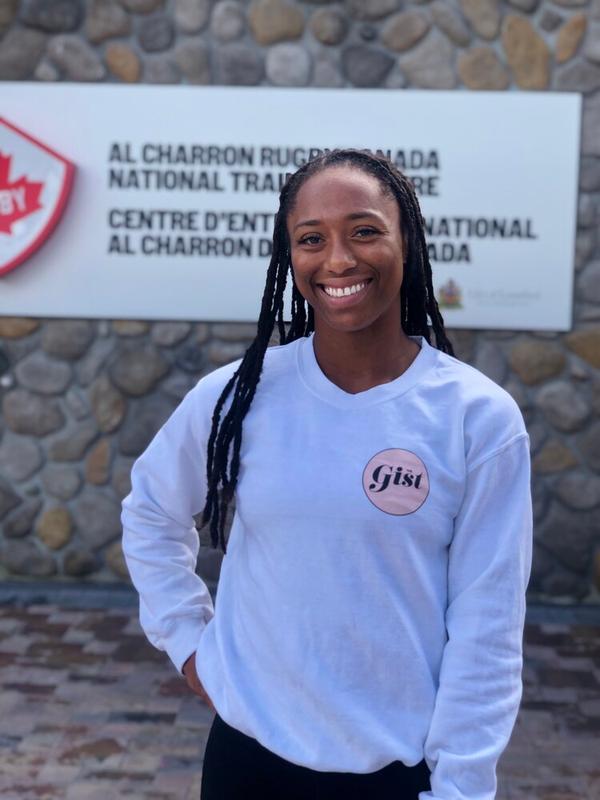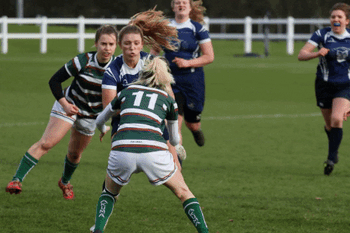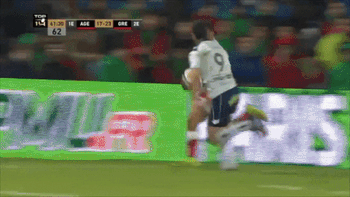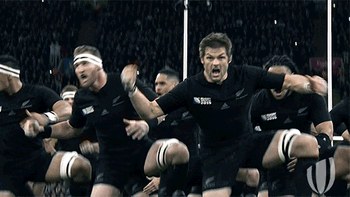Charity Williams

Introducing GIST Athlete Ambassador Charity Williams!
Charity Williams is, in one word, resilient. In two words: resilient and amazing. After overcoming a major setback in 2015 (keep reading for more), Charity became the youngest player on Canada’s bronze-winning rugby sevens team at the Olympic debut of the sport in Rio 2016. Now, she’s focused on two things: bringing home gold at the Tokyo 2020 Summer Olympics, and petting her friggin’ adorable dog.
Let’s get to our interview with Charity:
Lexie, at The GIST (TG): Okay, first of all, your adorable dog is named Arya. Arya as in Arya Stark?
Charity Williams (CW): Yes. I’m a huge Game of Thrones nerd.
TG: Do you want to talk about the ending of Game of Thrones?
CW: I...ugh. I disliked it. But you know, I really appreciated their work ethic and effort. I’ll give them that.
TG: Nicely said. We could spend our whole interview on the GoT finale, but let’s talk about you as an incredible athlete with a great story instead.
TG: First off, how did you first start playing rugby?
CW: Growing up, honestly, my only real dream was to be an Olympian. I was in gymnastics, but by the time I was 13 or 14 I realized that goal wasn’t going to be accomplished in that sport. So then in high school, my buddy told me about this sport that I had never seen or heard of before called rugby…she was like yeah it’s about to become an Olympic sport, you should give it a try. So, I went out for a practice and fell in love with it almost instantly.
TG: That’s great. What is it about rugby that stuck for you and made you fall in love with it?
CW: Rugby has always made me feel very included and appreciated.
Rugby has a place for literally everybody. There are so many working components to make a team, and so many different types of roles to fill. There are a lot of athletes, especially on my team, who were told they were too big or too small in other sports, and now they are national level athletes getting ready for the Olympics.
And, I also just really love the contact in rugby. Being a strong female is actually celebrated in this sport. I’ve always been strong, and I’ve always trained my body to be the best it can be, and this sport just really showcases that.
I’ve always had an athletic build, even growing up, and when you’re young, kids can be a little mean if you’re different or stand out. So it was really cool to find rugby where you need to be strong and tough and fit, so I’ve always felt comfortable here…and now it’s become my job.
TG: What is something you’re most proud of for overcoming or accomplishing so far in your career?
CW: Well, leading up to the Rio 2016 Olympics, I had been let go from the team at the beginning of the training season. So that was really, really hard. For one, it was my job, and I was living in Victoria to train for it, so it really changed my whole day-to-day living. And then, my dream of going to the Olympics seemed like it was over and it was hard to come to terms with that. It took me a couple of weeks to just feel really sad. Plus, the Pan Am Games were going on in my hometown of Toronto, and I wasn’t part of that...it was just a really hard couple of weeks for me.
But then one of my strength and conditioning coaches sat me down and said, “let’s make a plan… what do you want to do?” And I said, “I want this. This is where I want to be. I want to go to the Olympics.”
So we wrote down all the steps to take to get back on the team. And step-by-step we went through that list. First, I emailed the coach to let him know I wanted to be part of the team and that I would show up and train and do whatever needed. So I did that for about six months, but I also had to get a job while going to the training sessions every day.
I was training three or four times a day on my own, or with a coach who took time out of his day to work with me, and eventually I got back to a place where I could be a threat physically on the field. Within six months, I was invited to join the team for a tournament in Dubai and got a “re-tryout”. Then, they re-carded (Editor’s note: “carding” or “carded athletes” refers to elite level athletes who are provided funding through Sport Canada. Otherwise known as the ‘Athlete Assistance Program’) me around January.
After being re-carded, my only goal was to stay there. I wasn’t thinking about the Olympics. I didn’t even think it was an option to actually go (Editor’s note: While 19 players train with the team, only 12 players and 2 reserves are actually selected to go to the Olympics). My only thought every single day was to be helpful to everyone who was going. So I just put my head down and worked and continued to get called up to more and more tournaments.
Then, about two months before the Olympics started my coach told me I was going...and I just could not believe it. It was the most insane news I’ve ever gotten. Honestly. I thought I was working toward 2020 — 2016 wasn’t even on my radar. I felt like my whole life flipped upside down. I was going to be an Olympian.
I was 19 and the youngest on the team. I went from cut from the squad in an Olympic year, to fighting and clawing my way back, to going to the Olympics.
TG: Wow. That is just...incredible. That takes so much perseverance. And it must be very isolating to deal with as there aren’t a lot of people that understand what you’re going through.
CW: Yeah, when I got cut I didn’t tell any of my family. I was ashamed, but I almost didn’t even believe it was happening. I sort of cut myself off from family and friends while I dealt with it. And, of course, I didn’t want to be a distraction to my teammates who were getting ready for the Olympics. I held a lot of it in, but in some ways it gave me more of a fight because I processed it, and realized that the decision to stay there and keep fighting was something that I wanted to do for me. But that was the most insane experience of my life.
TG: Unreal. Major kudos to you. And it all happened within one season. Can you speak to that training season, and what that entails as an Olympic rugby player?
CW: Yeah. Well, we’re very lucky. We’re centralized (aka live and train out of one city) 11 months out of the year. We train Monday to Friday from 8 a.m. until about 4 p.m. — it’s really a full-time job for us. We get a month off in the summer, and a couple of weeks at Christmas, but we’re pretty much going all year long.
And for each tournament or competition (other than the Olympics), only 12 players go with one extra reserve (of the 19 centralized players), so it’s almost like you’re trying out for a team all the time.
But, we’re also really lucky to be together because rugby is a very cohesive sport. It’s really important to learn your teammates’ patterns and tendencies to be successful, and we get to be together and do that.
And for resources, we get a lot of funding from Own The Podium (Editor’s note: Own The Podium is a Canadian not-for-profit that provides resources to help athletes and teams medal at the Olympic Games), because we’re gearing up to try to medal. Our program is top three in the world currently, so we do get a lot of funding support, which is great.
TG: Are the resources equal between the men’s and women’s rugby program?
CW: Um, no...It’s a really sticky situation. There is a lot going on internally with Rugby Canada, but we do get more funding through Own The Podium because we’re a very successful team. But inequality still exists between the funding for men’s versus women’s programs that the leadership on our team are really pushing to rectify.
TG: Sigh… We were really hopeful rugby would be different. But it’s awesome to hear that the players are pushing for equality. Looking forward, what are some personal goals you want to achieve next?
CW: I mean, really, I want to be a core, important part of the team. When I went to the Olympics in 2016, it was amazing to be selected, but my purpose on the team was really to help the other players be the best they could be and support them.
So this time around, I’ve been training to be someone who’s looked to in those moments. I want to become the best in the world. So I would say that my goal is to be a more important piece of the puzzle for my team and to really help us all bring home a gold medal.
TG: That’s awesome. We’re rooting for you! You’ve obviously overcome a lot so far in your career; what is something you’ve learned that you now pass along to others?
CW: Well, we recently had four new girls come on to the team who are fairly young, just coming out of their high school or university programs. And when you’re coming in fresh, you feel like you’re on top of the world, then all of a sudden, you come to a program where everyone is at the same level, or likely even a better level. So you can easily start to feel like you’re not good enough, and get down on yourself.
But what I tell the younger players is, “you are here for a purpose. If you weren’t good enough, or you didn’t have enough potential, you wouldn’t be here.” It’s easy to get discouraged if you’re not at the level you want or need to be at yet, but if you put in the work and time, you can get there. So, work hard, respect where you are, appreciate the information and advice that’s given, and every day just do the best that you can to improve. We’ve all been there. I was there for a really long time. I wasn’t even on the team and I put my head down and worked and cracked that. So that’s my advice in the longest way possible. *Charity chuckles*
TG: That’s great. And for you to take what you’ve learned and so quickly be able to make it useful for younger players is unreal.
TG: On a separate but similar note, we know that young girls drop out of sport at double the rate of their male counterparts by the age of 14. How do you think we can combat this?
CW: I think it has a lot to do with what you see in the media. It’s hard when you’re young, kids can be so ruthless and you don’t want to be embarrassed. I think kids just drop out of sports sometimes because it’s so much easier than failing.
But, I think something that helped me when I was growing up, was seeing athletes’ failures as much as their successes. Oftentimes, all we see is this person as the best in the world, but kids need to see that they don’t have to be perfect right away, or win every single time. It doesn’t help you learn or understand what it takes to be the best. So I think kids just need to see that everyone messes up at all levels. The best in the world make mistakes and it doesn’t make them any less of an athlete.
TG: That is a really, really great point. Thank you!
TG: Now, let’s mix it up with some rapid-fire questions. Here we go:
TG: What are you binge-watching right now?
CW: Glee right now! I’ve seen it so many times. It’s just so good.
TG: What movie can you quote the best?
CW: Ah. It’s so embarrassing! One of my favourite movies is Talladega Nights…it’s just so funny. Should I say that? I don’t know if I should. *Charity laughs* Okay, please don’t print that. I’m embarrassed.
TG: You can invite any 3 people to dinner… who would it be? And what are you eating?
CW: Um, Serena Williams, obviously. Leonardo DiCaprio, he’s amazing and I want to know everything about him… and Michelle Obama. And we’d have some nice medium rare steak and some mashed potatoes and asparagus. (Editor’s note: Please invite us, too!)
TG: We also interviewed your teammate Bianca… if we asked her to give us one thing we don’t know about you, what would she have said?
CW: Maybe she would say that I have a sugar addiction that I’m trying to fix.
TG: What is one thing we don’t know about Bianca?
CW: Um… oh my gosh… Bianca. She’s the funniest person of all time. Should I try to say something nice or no? There’s not much she does wrong. She totally laughs like she is…a hyena. No! I don’t know! She’s really awesome.
TG: What song do you have on repeat right now on Apple music/spotify?
CW: Oh! Beyoncé - Partition
TG: What are your favourite and least favourite workouts?
CW: Favourite is power cleans…I feel so strong, I love them! And my least favourite workout is any sort of conditioning. We do these 100m sprints that really suck…
TG: Okay, and finally regarding a recent Instagram story, fans want to know when can we expect to see you go pro in golf?
CW: Omg that’s so embarrassing! That’s funny… I shouldn’t have posted it. I don’t even know how that happened. Hilarious.
That's #thegistofit
Don't get The GIST’s free twice-weekly newsletter yet? Let's make it inbox official.
Enjoying this article? Want more?

Sign up for The GIST and receive the latest sports news straight to your inbox three times a week.


